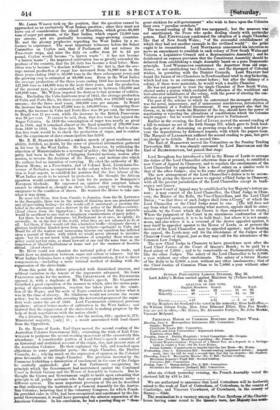Lord Brougham has introduced a bill in the House of
Lords to arrange the duties of the Lord Chancellor otherwise than at present, to establish a new Court of Appeal in Chancery, and to regulate the emoluments of the Lord Chancellor by appointing him a fixed salary on a similar scale to that of the other Judges ; also to fix some other judicial salaries.
The new arrangement of the Lord Chancellor's duties is to be accom- plished by giving the Queen power to appoint a Chief Judge in Chancery, with all the present jurisdiction of the Lord Chancellor except in bank- ruptcy and lunacy.
The new Court of Appeal may be established by her Majesty's letters pa- tent; it may consist of the Lord Chancellor, the (Thiel Judge in Chan- cery, the Master of the_Rolls, the Vice-Chancellors, and the Lord Chief Baron ; " so that three of such Judges shall form a Court," of which the Lord Chancellor or the Chief Judge must be one. [fro bill does not say from what Courts, or concerning what matters, appeals shall be enter- tainable by the Court which the Crown is thus empowered to create.] Where the judgment of the Court is an unanimous confirmation of the decree appealed against, it is to be held final ; but where it is not unani- mous, and also where it is a reversal of the decree appealed against, it may itself be appealed against to the House of Lords, as at presentthe decrees of the Lord Chancellor may be appealed against ; and in hearing the appeal, the Lords may call for the attendance of the Judges of the Chancery Court of Appeal, just as they may call for the attendance of the Common Law Judges.
The new Chief judge in Chancery to have precedence next after the Lord Chief Justice of the Court of Queen's Bench ; to be paid by a fixed salary of 7,000/. ; and to be removeable on Parliamentary address, like the other Judges. The salary of the Lord Chancellor to be 8,0001. a year without any other emoluments. The salary of a future Master of the Rolls to be 6,0001. a year without any other emoluments ; that of the Chief Justice of Common Pleas to be 7,0001. a year without other emoluments.


























 Previous page
Previous page